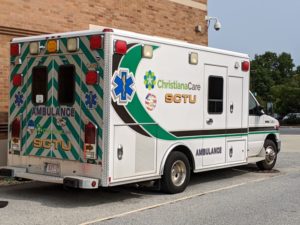At ChristianaCare, nothing gets our caregivers’ pulses going quite like an incoming heart attack patient.
In particular, caregivers have improved care for patients with ST-Elevation Myocardial Infarction (STEMI), a very serious type of heart attack in which one of the heart’s major arteries that supplies oxygen and blood to the heart muscle is blocked. With more than 350 heart attack patients annually at ChristianaCare — nearly one every day — experience plays a huge role in the outstanding performance and expertise and commitment to urgent heart care. Christiana Hospital treats more heart attacks than 95% of hospitals nationwide, and more than any other hospital in the Philadelphia region.

When a person has a heart attack, the amount of time it takes from the beginning of their attack to the time they receive a revascularization – a procedure to end the heart attack – is critical. The longer the amount of time, the more likely the person will die or suffer debilitating effects from the attack.
To save a patient’s life, the American Heart Association (AHA) recommends that the time a heart attack patient arrives at the front doors of the hospital’s emergency department to the time patient receives a revascularization should be no longer than 90 minutes. We have cut that time to 52.25 minutes for most patients and to 32.6 minutes for patients closest to our Christiana Hospital in New Castle County, Delaware.
We continue to cut precious time from the moment a patient’s heart attack is recognized to the moment they receive life-saving care.
How fast is heart attack intervention at ChristianaCare?
At ChristianaCare, our median of 52.25 minutes from arrival at the emergency room to treatment is nearing half the AHA’s recommended time of 90 minutes. We wanted to get the time to treatment even lower. In our commitment to being exceptional today and even better tomorrow, we scrutinize each heart attack patient’s case and evaluate it against standards set by the AHA and ACC. Through continuous performance improvement appraisals, we identify any potential barriers to care and address the opportunities immediately. We are constantly reevaluating our performance so that we are diagnosing and treating patients using the highest standards of care.
What role do paramedics play in faster treatment?
We developed a closer partnership with New Castle County Paramedics. Now if the paramedics identify a patient as having a heart attack, they use the New Castle County Dispatch System to alert us at the hospital that the patient with a probable STEMI is coming in. This early notice enables us to activate our response even more quickly. That way, the heart attack patient bypasses the emergency department and is whisked straight to the operating room for the revascularization.
The American Heart Association recommends that this “paramedic-to-revascularization” time should also be under 90 minutes. With this partnership, the median average for residents of New Castle County, Delaware, for “paramedic-to-door” time is even lower, at a median of 83.4 minutes. This is true even though many of our heart attack victims are coming from Pennsylvania. In some New Castle County residents’ cases, we were able to perform this “paramedic-to-revascularization” time within 50 minutes.
For our successful efforts, we received the AHA’s Mission: Lifeline Gold STEMI Award, as well as Chest Pain Center Accreditation with Primary PCI and Resuscitation from the American College of Cardiology (ACC).
Moreover, ChristianaCare recently received designation as a HeartCARE Center National Distinction of Excellence from the ACC, becoming the first hospital system in Delaware and one of only 28 in the U.S. to attain this highest recognition from the ACC, a nonprofit medical association representing more than 50,000 cardiovascular specialists.
What happens once the patient arrives at the hospital?
The Emergency Department attending doctor, the interventional cardiologist, a catheterization lab nurse and a medical resident gather meet the patient in triage, do a rapid assessment, obtain medical history and review the electrocardiogram provided by Emergency Medical Services.
This rapid evaluation enables the team to get the patient to the catheterization lab more quickly which cuts the “door-to-revascularization” time by an average of 18 minutes. Faster procedures save lives and heart tissue by interrupting heart attacks much sooner and allowing for restored blood flow to the heart.
How has the process for delivering care improved?
The lifesaving revascularization procedure is helping more and more victims walk out of hospital and even go back to work in less and less time. Fewer people are dying or losing as much heart muscle and health due to faster intervention. A heart attack is becoming a medical emergency that can be resolved more quickly. We’re helping people live longer with better quality of life.
Has COVID-19 affected heart care?
We cannot stress enough the importance of getting heart care when you need it. Don’t wait. We have COVID precautions in place for your protection and the protection of our caregivers.
We saw a decrease in patients coming in for regular preventive heart care and for acute heart care during the height of COVID in April and May. We are working hard to lessen fear of COVID exposure. ChristianaCare is part of an effort with more cardiologists nationwide as well as emergency medicine physicians and medical societies across the country, uniting to underscore the message about the need to get medical help to avoid the risk of death or lasting injury. It’s safe to come back for care. We are here for you.
To make an appointment with a specialist at ChristianaCare’s Center for Heart & Vascular Health, call 302-733-1000.



